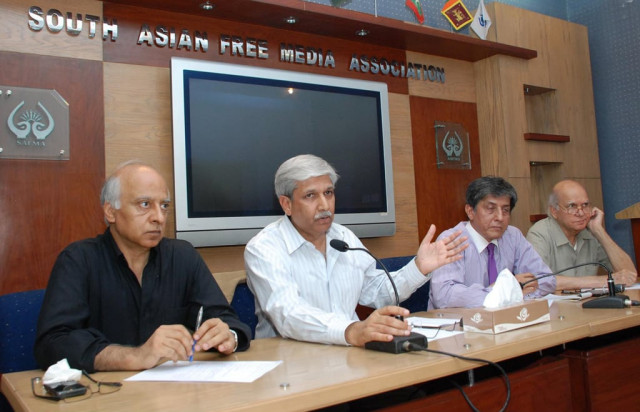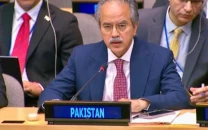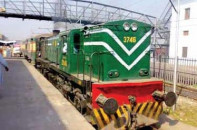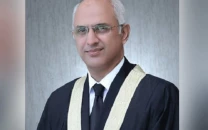Post-leak: Abbottabad Commission’s report should be case study for future policies
A seminar at SAFMA discussed the effects of the leaked report of the commission.

Panellists demanded that the government release the report to the public. PHOTO: INP
The leaked Abbottabad Commission report provides an opportunity for Pakistan’s leaders to introspect and review the country’s intelligence apparatus.
This was the view of panelists at a discussion on the Abbottabad Commission report organised by the South Asian Free Media Association on Thursday.
The commission was constituted in 2011 by the Supreme Court at the government’s request to look into the events that led to the US’s Operation Geronimo in Abbottabad on May 2, 2011, which resulted in the killing of Al Qaeda chief Osama Bin Laden (OBL). The commission’s report was not made public by the Government of Pakistan but leaked copies were released by foreign media on July 8.

Panelist Imtiaz Gul, an author and journalist, said the leaked report shows that the intelligence agencies did not give the commission much to work with, but the commission did mention lack of coordination between the different agencies.
“(The) commission’s report offers us a great opportunity to review the roles of respective intelligence agencies,” said Gul.
Gul said the roles should be redefined and inter-agency coordination should be streamlined but with a proper legal framework and policies.
Moderator Ejaz Haider, a broadcast and print journalist, said the commission’s leaked report — which he believes was the final draft but an earlier version — highlights civil-military imbalance in the country in terms of the military’s hubris and the civilians’ abdication.
He also said there is an urgent need to reconfigure the intelligence set-up. Instead of the Inter Services Intelligence gathering counterterrorism intelligence, the Intelligence Bureau’s capacity should be enhanced, Haider said.

However, panelist Air Vice-Marshal (Retired) Shahzad Chaudhry cautioned that the military intelligence agencies might not cooperate with such a proposed reformation.
“The military is not going to give civilians power on a platter,” Chaudhry said. “Now you have to decide whether you want to take that power through force or through brains, and what might be the consequences of that.”
The leaked Abbottabad Commission report has blamed OBL’s presence on incompetence, but stopped short of directly pointing out whose incompetence was to blame, though it implicitly pointed fingers at the collective failure of state organs.
Chaudhry felt blaming the Pakistani authorities’ incompetence was an easy way out as the blame for complicity would have required further investigation and proof. He also pointed out that there are narratives, perpetuated perhaps partly by the establishment, which support terrorism on the basis of religion.
The panellists said the commission could not ascertain who purchased the land on which OBL’s compound was constructed and where he was killed. They said it is a matter of conjecture, since it is not easy to determine if OBL was facilitated within Pakistan, but it is unlikely that OBL could have been staying in Pakistan under the radar without anyone’s help.
The panellists said the sympathy in the lower cadres of the armed forces about jihad and the societal silence at the illegal growth of madrassas in urban centres also points at the entrenched narrative Pakistan is sheltering.
They demanded the government to make the report public and turn it into a case study on which Pakistan’s future counterterrorism policies and strategies could be based.
Published in The Express Tribune, August 2nd, 2013.



















COMMENTS
Comments are moderated and generally will be posted if they are on-topic and not abusive.
For more information, please see our Comments FAQ